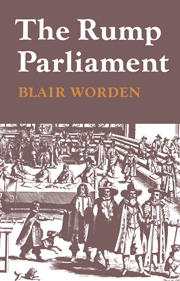Book contents
- Frontmatter
- Contents
- Dedication
- Acknowledgements
- Author's Note
- List of abbreviations
- Introduction
- PART ONE THE RUMP AND THE RUMPERS
- PART TWO THE RUMP AND REFORM
- 6 Law reform
- 7 Puritans and politicians
- 8 Electoral reform
- PART THREE THE STRUGGLE FOR SURVIVAL, FEBRUARY 1649–SEPTEMBER 1651
- PART FOUR PARLIAMENT versus THE ARMY, SEPTEMBER 1651–APRIL 1653
- PART FIVE THE DISSOLUTION OF THE RUMP
- APPENDICES
- Bibliographical Guide
- Index
7 - Puritans and politicians
Published online by Cambridge University Press: 29 January 2010
- Frontmatter
- Contents
- Dedication
- Acknowledgements
- Author's Note
- List of abbreviations
- Introduction
- PART ONE THE RUMP AND THE RUMPERS
- PART TWO THE RUMP AND REFORM
- 6 Law reform
- 7 Puritans and politicians
- 8 Electoral reform
- PART THREE THE STRUGGLE FOR SURVIVAL, FEBRUARY 1649–SEPTEMBER 1651
- PART FOUR PARLIAMENT versus THE ARMY, SEPTEMBER 1651–APRIL 1653
- PART FIVE THE DISSOLUTION OF THE RUMP
- APPENDICES
- Bibliographical Guide
- Index
Summary
The Rump, when it came to power, was widely expected to introduce immediate and radical religious change. Men had long feared that ‘fierce and ignorant separatists’, being ‘set up and maintained as rulers both in church and state’, would ‘authorise ignorance’ and destroy the fabric of church, state and society. In the weeks between Pride's Purge and the execution of the king, heresy and schism seemed finally to have triumphed. So, at least, might anyone have believed who listened to the propaganda aimed at the new regime. The army, ‘in all men's opinions being rather set for the dissolving, than the settling of religion’, would, it was claimed, ‘cut the reins of church government … We shall have as many religions, as there be men of different judgements. So farewell Protestant religion.’ Pamphleteers, depicting the purged parliament as the mere tool of the army, tarred soldier and M.P. alike with the brush of heresy: ‘They turn the church topsy-turvy by an universal toleration of atheism, heresy and impiety, abolish tithes, the maintenance of the ministry, and level the estates of nobility and gentry.’ As John Owen told the House of Commons soon after the king's execution, ‘it is the toleration of all religions, or invented ways of worship, wherein your constitutions are confidently antedated in many places of the nation’, which ‘almost everywhere is spoken against’; ‘the thing itself withal being held out as the most enormous apprehension, and desperate endeavour for the destruction of truth and godliness’.
- Type
- Chapter
- Information
- The Rump Parliament 1648–53 , pp. 119 - 138Publisher: Cambridge University PressPrint publication year: 1974



